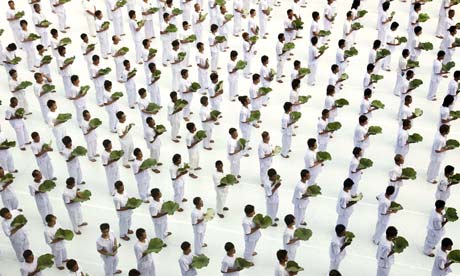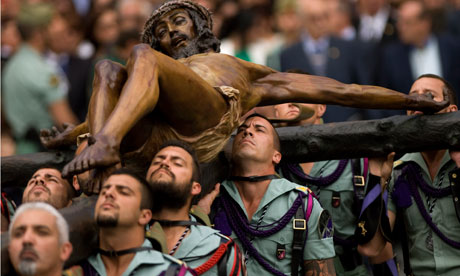
“Blessed is the nation that doesn’t need heroes" Goethe. “Hero-worship is strongest where there is least regard for human freedom.” Herbert Spencer. "My 80% friend isn't my 20% enemy" Ronald Reagan.
Search This Blog
Wednesday 6 August 2014
Mindfulness is all about self-help. It does nothing to change an unjust world

Thursday 3 July 2014
Rowan Williams: how Buddhism helps me pray
Wednesday 18 September 2013
What is Religion
Part 1: civil religion and the state
Part 2: why football doesn't measure up

part 3: the role of the ritual

part 4: divinity, God and 'real' religion

"In both Assyrian and Israelite versions of the vassal covenant the subordinate must keep the stipulations of the treaty or face the most disastrous consequences: in Israel God, in Assyria the gods, will inflict leprosy, blindness, violent death, rape, and invasion by 'a nation you have not known' if the subordinate is disloyal."
-----
How are religions born?

Wednesday 9 May 2012
Saturday 3 February 2007
WHEN OPIUM CAN BE BENIGN
Feb 1st 2007
China's Communist Party, reconsidering Marx's words, is starting to
wonder whether there might not be a use for religion after all
"DEVELOP the dragon spirit; establish a dragon culture," urge large
green characters at the high school in Hongliutan, a poor village at
the foot of a range of bleak loess hills. Though dragon can be a
synonym for China, it is a god known as the Black Dragon that is being
invoked here. Without funds from the Black Dragon's hillside temple, in
a gully behind the village, the school would not exist. Nor, most
likely, would the adjacent primary school and the irrigation system
that brings water from the nearby Wuding River to the village's maize
and cabbage fields.
Many local governments in rural China are mired in debt. Recent central
government efforts to keep peasants happy by abolishing centuries-old
taxes have not made life any easier for these bureaucracies. With their
revenues cut, rural authorities have found it ever more difficult to
scrape together money for health care and education. So they are only
too happy to allow others to share the burden of providing these
services--even the Black Dragon, whose 500-year-old temple was
demolished by Maoist radicals during the Cultural Revolution in the
1960s. Now officials in Yulin, the prefecture to which Hongliutan
belongs, give the temple their blessing.
The revival of the Black Dragon Temple's fortunes is part of a
resurgence of religious or quasi-religious activity across China
that--notwithstanding occasional crackdowns--is transforming the social
and political landscape of many parts of the countryside. Religion is
also attracting many people in the cities, where the party's atheist
ideology has traditionally held stronger sway.
The resurgence encompasses ancient folk religions and ancestor worship,
along with the organised religions of Buddhism, Taoism, Islam (among
ethnic minorities) and, most strikingly, given its foreign origins and
relatively short history in China, Christianity. In the face of this
onslaught, the party is beginning to rethink its approach to religion.
It now acknowledges that it may even have its uses.
In Hongliutan the party appears in retreat. It is not the party
secretary Zhang Tieniu who holds sway. Mr Zhang was the youngest party
chief in the prefecture when he was appointed last year at the age of
32. But in a culture that reveres age, some villagers refer to him
dismissively as a "lad". The man in charge in Hongliutan is 64-year-old
Wang Kehua. Mr Wang happens to belong to the village's main clan. He is
also the village's elected chief (a post which in most villages is
subordinate to that of party secretary). More to the point, he controls
the temple and its money.
It was Mr Wang's idea to rebuild the temple in 1986, a decade after
Mao's death. Mr Wang, who had become one of the village's wealthiest
men by wheeling and dealing elsewhere, donated some of his own money
and organised villagers to add theirs. It was a promising venture.
Historically, the Black Dragon Temple had a reputation extending far
beyond the village. The dragon was renowned in the parched semi-desert
of the north of Shaanxi Province, 600 kilometres (370 miles) west of
Beijing, as a bringer of rain. If the temple was rebuilt, people would
come, pray to the dragon--and spend money.
Mr Wang does not, however, speak of commercial motives. In the bare
concrete-walled room he calls his office, he describes how, one after
the other, the half-dozen villagers who had destroyed the temple in the
1960s fell victim to the vengeful dragon in subsequent years. The man
who had broken off the head of the Black Dragon's effigy (the god is
worshipped in a human-looking form, as shown in the picture above) had
his head blown off when a factory boiler exploded. Another bled to
death after accidentally chopping his foot with an axe. One was crushed
by a donkey cart. Their offspring also suffered ill fate. These events,
says Mr Wang, convinced him of the power of the dragon and of the
importance of reviving its worship.
The temple has no clergy. Visitors are mainly drawn by their belief in
the dragon's power to tell the future. Many want to know whether
business ventures or marriages will succeed. Mr Wang asked the Black
Dragon whether the divinity approved his appointment as temple chief.
It did. The dragon's responses are given in the form of obscurely
worded classical poems written on pieces of paper issued by a
70-year-old villager, Chen Yushan, clad in his blue padded Mao suit. Mr
Chen offers his interpretation of what these poems mean. An
entrepreneur who is told his business will be successful, and who then
enjoys financial success, is quite likely to make a big donation to the
temple.
TURNING A BLIND EYE
Officially, the party regards folk religion as superstition, the public
practice of which is illegal. But in many rural areas officials now
bend the rules. In Yulin prefecture, with 3.4m people, there are 106
officially registered places of worship and many more that are not
officially sanctioned. Most are not part of the five mainstream
religions (China regards the two Christian traditions, Catholicism and
Protestantism, as separate) that the party recognises. But Yulin has
allowed the Black Dragon Temple to affiliate itself with the
government-sponsored Taoist Association. This gives it a cloak of
legitimacy. So too does an arboretum that Mr Wang has planted with
temple funds (at the dragon's request, he says, but it also helps him
show officials how the village is contributing to government efforts to
stop the desert encroaching).
Local officials themselves benefit from the greater tolerance. For all
the party's dictatorial ways, government officers are often fearful of
triggering unrest by enforcing unpopular policies that are not all that
vital to the party's interests (hence the increasingly patchy
implementation of population control). Demonstrations in an official's
jurisdiction can do far more damage to his career than turning a blind
eye to popular religion--so long as such activity does not directly
challenge the party.
There are also more tangible rewards. In his book "Miraculous
Response", Adam Yuet Chau of the School of Oriental and African Studies
in London says that temples applying for official registration
typically have to treat local officials to banquets. Officials, he
adds, support temples that pay them respect and tribute. They also gain
financially from taxes levied on merchants who do business at temple
fairs. Policemen invited to maintain order at these occasions are paid
with cash, good food and liquor.
In the view of local officials, Mr Chau argues, temples play the same
kind of role as commercial enterprises. They generate prosperity for
the local economy and income for the local government. This is
especially true of the Black Dragon Temple, which says it attracts
200,000 people to its ten-day summer fair (the Black Dragon himself,
villagers say, has also shown up in the form of an unusually shaped
cloud).
Evidence of China's religious revival can be seen throughout the
countryside in the form of lavish new temples, halls for ancestor
worship, churches and mosques (except in the far western province of
Xinjiang, where the government worries that Islam is intertwined with
ethnic separatism and keeps tighter rein). Officially there are more
than 100m religious believers in China (see table), or about 10% of the
population. But experts say the real number is very much higher.
This does not mean that China has embraced religious freedom. Some
religions--Tibetan Buddhism, Islam as practised in Xinjiang,
Catholicism and "house church" Protestantism, which involves informal
gatherings of believers outside registered churches--are still subject
to tight controls because of the party's fears that their followers
might have an anti-government bent. A seven-year-old crackdown on Falun
Gong, a quasi-Buddhist sect that flourished in the 1990s, is still
being pursued with ruthless intensity. Many Falun Gong practitioners,
as well as lesser numbers of followers of other faiths who refuse to
accept state attempts to regulate their religions, are imprisoned in
labour camps.
Within the party, however, debate is growing about whether it should
take a different approach to religion. This does not mean being more
liberal towards what it regards as anti-government activities. But it
could mean toning down the party's atheist rhetoric and showing
stronger support for faiths that have deep historical roots among the
ethnic Han majority. The party is acutely aware that its own ideology
holds little attraction for most ordinary people. Given that many are
drawn to other beliefs, it might do better to try to win over public
opinion by actively supporting these beliefs rather than grudgingly
tolerating them or cracking down.
Pan Yue, then a senior official dealing with economic reforms and now
deputy director of the State Environmental Protection Administration,
argued in an article published in 2001 that the party's traditional
view of religion was wrong. Marx, he said, did not mean to imply that
religion was a bad thing when he referred to it as the opium of the
people. Religion, he said, could just as easily exist in socialist
societies as it does in capitalist ones. He also singled out Buddhism
and Taoism for having helped to bolster social stability through
successive Chinese dynasties. Stability being of paramount concern to
the party today, Mr Pan's message was clear.
IN PRAISE OF HARMONY
His article angered party conservatives at the time: the party's
official stance is that religion will die out under socialism. But more
recently the party itself has begun to put a more positive spin on the
role of religion. Last April China organised a meeting of Buddhist
leaders from around the world in the coastal province of Zhejiang (it
did not, however, invite the Dalai Lama, Tibet's exiled spiritual
leader). The event was given considerable prominence in the official
media. The theme, "A harmonious world begins in the mind", echoed the
party's recent propaganda drive concerning the need for a "harmonious
society". It implied just what Mr Pan had suggested-- that the opium
Marx was talking about should be seen as a benign spiritual salve. In
October the party's Central Committee issued a document on how to build
a harmonious society, arguing that religion could play a "positive
role".
The party's change of tone coincides with its recent efforts to revive
traditional culture as a way of giving China, in its state of rapid
economic and social flux, a bit more cohesion. The term "harmonious
society", which in recent months has become a party mantra, sounds in
Chinese (HEXIE SHEHUI) like an allusion to classical notions of social
order in which people do not challenge their role in life and treat
each other kindly. It is, in effect, a rejection of the Marxist notion
of class struggle.
Officials are now encouraging a revival of the study of Confucianism,
a philosophy condemned by Mao as "feudal" and which can be
quasi-religious. Since 2004 China has sponsored dozens of "Confucius
Institutes" around the world, including America and Europe, to promote
the study of Chinese language and culture.
In the countryside the revival of traditional values has needed little
encouragement. Clan shrines, where ancestors are worshipped, have
sprung up in many rural areas, particularly in prosperous coastal and
southern regions. The revival of clan identity (in many villages a
substantial minority, if not a majority, of inhabitants have the same
surname, which they trace back to a common ancestor) has had a profound
impact on village politics. Those elected as village leader often owe
much of their authority to a senior position in the clan hierarchy.
Control of the ancestral shrine confers enormous power. It is often
clan chiefs, rather than party officials, who mediate disputes. The
shrine will lend money for business ventures--so long as the recipient
has the right name.
WHERE CHRISTIANITY IS A FEMINIST ISSUE
Ironically, the growth of clan power has helped to fuel the growth of
Christianity in some parts of the countryside. In a village in the
eastern province of Shandong, the wife of a former party secretary was
a Protestant who attended prayer meetings with her female friends.
Their religious enthusiasm was apparently fuelled by the subordinate
role of women in the clan. A married woman is expected to revere only
her husband's ancestors but is excluded from his clan hierarchy. The
fast growing house-church communities often disapprove of ancestor
worship, thus attracting women who feel fettered by clan strictures.
The parlous state of China's health-care system has also given a
powerful boost to religion. Falun Gong owed much of its success in the
1990s to claims that it could heal without the need for medicine
(cash-strapped state-run hospitals usually sell medicines to patients
at inflated prices in order to boost their revenues). In the village of
Donglu in Hebei Province, about 140km south of Beijing, Catholic nuns
have set up a three-storey clinic where they offer ophthalmic, dental
and pediatric services for what they say is a fifth of the price of
government-run clinics or private ones run for profit. A picture of
Jesus is pasted to the wall in the operating theatre.
An apparition of Mary is said to have occurred in Donglu in 1900 when
local Catholics were fighting off an assault by members of the
fanatical Boxer cult trying to destroy their church. This has made the
village a site of great devotion for Catholics. Every May for the past
decade, the police have cordoned off Donglu to prevent thousands of
Catholic pilgrims making their way to the village to celebrate the
feast of Mary. Many of the pilgrims are loyal to an underground church
which claims closer ties with Rome than the state-approved Catholic
church. Yet for all Donglu's sensitivity, the local government appears
content to let Catholics run the hospital, which is a key public
service.
Chinese officials are even urging religious organisations to learn from
Hong Kong, where religious groups run many schools and hospitals. In
late November, Ye Xiaowen, the head of the State Administration of
Religious Affairs which oversees the five officially recognised
religions, said that religious groups had helped reinforce social
stability in the former British colony with their contribution to
public services. The Archbishop of Canterbury, Rowan Williams, who
visited China in October, wrote afterwards in the TIMES that there was
now a sense in China that civil society needed religion, with its
motivated volunteers. During his trip he remarked on an "astonishing
and quite unpredictable explosion" in Christian numbers in China in
recent years.
The party still mouths its alarmist rhetoric about what it says are
foreign efforts to use religion as a means of undermining the party's
grip on power. Yet the appointment of Pope Benedict XVI, following the
death in 2005 of John Paul II who was seen by China as a more die-hard
anti-communist, has encouraged tentative efforts by China to restore
the ties with the Vatican that were severed in 1951.
Last month the Vatican decided to appoint a commission to handle
Chinese relations. But progress has been far from smooth. On November
30th, much to the Vatican's annoyance, China's state-backed Catholic
church appointed a bishop without the Vatican's prior approval for the
third time that year. Since 2000 China had done so only with the
Vatican's tacit assent. In August, however, China released a bishop
loyal to the underground church, An Shuxin, who had been arrested a
decade earlier after leading celebrations of the feast of Mary in
Donglu.
An even more tentative rapprochement is under way with the Dalai Lama.
Since 2002, China has held five rounds of talks with his
representatives, most recently last February. But China retains
profound fears that the Dalai Lama's real intention is to separate
Tibet, and adjoining areas, from China (see article[1]).
Notwithstanding the government's suspicions, Tibetan Buddhism has
acquired a certain chic in Chinese cities in recent years, with some
urbanites regarding it as spiritually more pure than Chinese-style
Buddhism, which has strong links to the government.
Within its own ranks, the party knows that some members practise
religion even though this is against the party's rules. Falun Gong
claimed many adherents among party members in the 1990s. In the
countryside, party secretaries routinely take part in religious
ceremonies. Mr Wang at the Black Dragon is not a party member, but in
other villages in the region temple chiefs double up as village party
bosses. If the party is still trying to keep its members atheist, it is
fighting a losing battle.
One result of allowing religion to play a bigger role in providing
education could be that the party finds its efforts to inculcate its
ideology among the nation's youth becoming ever more frustrated. In
Hongliutan, the temple-sponsored middle school attracts many boarders
from the town--a reversal of the normal flow of village pupils to the
towns. Thanks to the temple's sponsorship, the middle school's fees are
half of what they would be at a government school, teachers say. With
this sort of discount, the popularity and influence of the Black
Dragon, and other such spiritual beasts, seems certain to spread.

